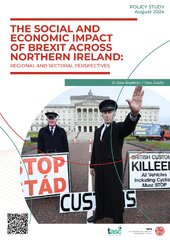The social and economic impact of Brexit across Northern Ireland
Northern Ireland's EU membership once reduced trade, customs, and immigration barriers, fostering economic and service connections with the Republic of Ireland. This integration was crucial to the Good Friday Agreement’s peace-building efforts, which assumed the UK and ROI would stay in the EU under the European Court of Justice. Brexit, however, has disrupted this landscape, becoming a defining political issue in Northern Ireland, with significant social and economic impacts across public services, identity, and social cohesion.
This policy study, based on semi-structured interviews with 19 leaders from politics, civil society, and the public sector, explores the perceived effects of Brexit on communities and service users throughout Northern Ireland. The diverse perspectives gathered reveal notable regional and sectoral differences. Yet, a common concern emerged: prolonged uncertainty driven by political impasse, particularly due to the suspension of Northern Ireland’s devolved government at Stormont, and ambiguity about the future.
Amid this uncertainty, leaders frequently stressed the need for a positive vision for Northern Ireland that reflects its unique status under the Windsor Framework, a post-Brexit arrangement guiding NI’s relationship with both the UK and EU. This raises critical questions about what a future partnership between Northern Ireland and the EU might entail, both practically and in terms of long-term advantages.
As Northern Ireland navigates its complex, evolving relationship with the EU post-Brexit, this study highlights the challenges and potential opportunities for its economy, governance, and communities.
